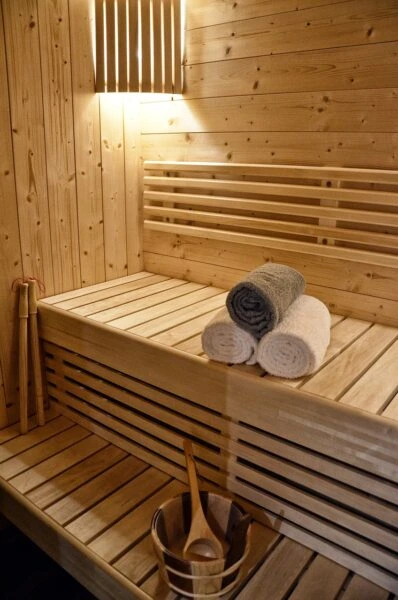The Best Time to Sauna for Optimal Health Benefits: Morning, Afternoon, or Evening?
For those wondering when is the best time to sauna, morning slots are ideal – they fire up your metabolism and create momentum for an energetic, productive day.
Nighttime sauna sessions soothe you and prepare you for deeper and more restful sleep.
Those who take saunas regularly experience a multitude of health benefits, including better relaxation, improved circulation and muscle recovery.
Knowing how timing your sauna sessions will impact your experience will help you get the most out of these benefits.
Whether you want to reduce stress after a long day or support your workout recovery, recognizing the optimal time for your sauna sessions will help you achieve your health goals.
Let’s take a look at how morning, noon, and night affect your sauna experience and how to customize your session to meet your desired benefits.
Why Optimal Sauna Timing is Key
Knowing the best time to sauna can make all the difference between a blessing and a burden. The underlying physiological processes at play in our bodies change at different times during the day, which affects how we react to heat exposure.
Morning sauna usage enhances your mental clarity. It truly does create a positive mindset that overwhelms the rest of the daily experience. When you time your sauna sessions to align with your body’s natural circadian rhythms, detoxification increases. At certain points in the day, your body is more suited to flush out toxins.
Tailoring Sauna to Your Body Clock
It’s important to make a sauna routine that paces according to your energy dips. While some people report feeling energized after an afternoon sauna, some prefer the serenity of an evening sauna.
Use shorter sessions of 5 to 10 minutes to start if you’re new to sauna use. As you adjust, work up to 15 to 20 minutes of exercise. Paying attention to your body’s cues makes it easier to find the right timing for your sauna sessions.
Aligning Sauna with Daily Rhythms
Plan sauna visits. Consider working sauna visits into your daily routine, particularly when high-stress days or weeks are expected.
Try to use sauna time as a transition from work to play, helping to keep the mind at ease. What role does seasonal change play in when you like to sauna most? Take, for instance, your natural desire to use the sauna more in the cold months.
Maximize Health and Wellness Benefits
Consider what your individual health goals are, and use those goals to help guide your sauna session planning. Research shows that post-workout use of a far-infrared sauna can greatly accelerate muscle recovery.
Consider combining your sauna time with other mindfulness practices for a deeper level of relaxation. Measuring how you’re getting healthier keeps you coming back to the sauna more often and helps create a community of wellness seekers united in improvement.
Factors to Determine the Best Sauna Time
Choosing the best time to use a sauna involves several factors that cater to your lifestyle, health goals, and personal preferences. Grasping these factors helps make sure you get the most out of your sauna session.
Personal Preferences and Daily Life
Choosing a sauna time that works with your day-to-day life is important. Take advantage of sessions when you can be at your most comfortable and restive state.
Trying both morning and evening sauna sessions will allow you to find out which time of day is better for your needs at that moment. For example, morning sauna treatments will energize your day and awaken, while evening treatments will help you begin to relax and restore.
Fitting sauna sessions into a regimen that includes things like yoga or meditation contributes to a healthier and balanced lifestyle overall. Ultimately, be sure to listen to your body’s cues, and if you start to feel overly fatigued or stressed, it can be helpful to revise your sauna timing.
Health Goals and Fitness Regimen
Fitting sauna use into your overall fitness goals will maximize your benefits. Start using the sauna 8 to 30 minutes before or after workouts to improve your warm-up and cool-down routines.
Regular sauna use has been shown to mitigate the recovery effects of heavier exercise by reducing muscle soreness. Monitor your health progress closely to determine the optimal sauna time for you.
This will assist you in tailoring the time based on your workout soreness and recovery requirements. Research indicates that regular sauna use four to seven times per week reduces the risk of cardiovascular mortality by up to 50 percent.
Seasonal and Environmental Impact
Understanding how your sauna timing should change with the seasons is equally important. The motivation to use the sauna more in colder months might help fight those winter blues.
Outdoor temperature and humidity levels can directly impact your comfort level and sauna effectiveness. Getting to know local sauna cultures can help you figure out which is the best sauna time for you.
Listen to Your Body’s Signals
Listen to your body’s responses to sauna use. Align sauna time with when you have more energy or stress levels are higher.
Beyond the physical benefits, implementing the sauna as a self-care tool can help fortify emotional regulation. Keep in mind that hotter temps can lead to dehydration quicker, so guide someone about hydrating before and after each session.
Morning Sauna Sessions: A Jumpstart
Morning sauna sessions are an extremely effective tool for jumpstarting a productive day and improving mental clarity. By adopting this practice, you ground yourself and allow for a more fruitful day to come. Not only does the heat invigorate your body, but the morning sauna sessions serve to clear your mind and focus your energy.
Research shows that morning sauna sessions enhance your cognitive function throughout the day. In short, they just as well change brain wave activity to increase alertness and engagement.
1. Energize Your Day with a Sauna
Starting your day with a sauna session will provide an incredible energetic jumpstart. So, before you reach for that cup of coffee or energy drink, think about your sauna as a holistic way to energize your day.
The energizing effects of heat therapy are immediately beneficial, enhanced even further with a little gentle stretching. This revitalizing practice truly boosts physical and mental preparedness for the day.
2. Morning Sauna: Benefits Breakdown
These invigorating morning sauna sessions provide all the cardiovascular benefits of regular sauna use, enhancing circulation and heart health. They can boost your creativity and alleviate anxiety, helping the morning become a more valuable part of the day.
As your body cools down, detoxification continues, allowing your body to detoxify and release toxins more efficiently. Believe it or not, this practice can improve athletic performance, since exposing your muscles to heat beforehand helps them better engage in activity.
Consistent sauna sessions can benefit your skin, helping you achieve a healthy glow.
3. Best Time and Session Length
Determining the best time to work your morning sauna session into your routine will vary based on your schedule. Consider session length.
Experiment with longer lengths, but usually maximize time to come in and out within 15-30 minutes. Change your frequency with what feels comfortable, and pay attention to how different sauna durations impact your energy levels and emotional state.
4. Hydration and Preparation Tips
Staying hydrated is super important, too. Third, drink water before and after your sauna session to avoid dehydration.
Bring along a little something to keep energy up, and plan to dress in layers to stay comfortable. We recommend bringing a towel and a water bottle for an optimal experience!
5. Morning Sauna and Circadian Rhythm
When we align sauna use with our circadian rhythm, it primes the body for greater alertness and focus. As we mentioned above, this practice makes a clear start to your day, encouraging wakefulness and aiding in regulating your sleep cycles.
Afternoon Sauna: Revitalization Strategy
This is why using afternoon sauna sessions can be a fantastic strategy to revitalize your energy levels during the workday. When the afternoon slump rolls in, a sauna session offers a natural pick-me-up that fights off tiredness.
Take this skip during your lunch break to turn a dull interruption into an enlivening reboot. You might just find that you come back to your work with more energy and concentration!
Midday Sauna: A Refreshing Break
Allowing time to use the sauna midday regularly is a winning strategy against tension and exhaustion. Especially on a busy workday, taking time to pause and refresh brings improved mental clarity and performance.
The relaxing warmth of the sauna helps you to unwind, and using the sauna in combination with breathwork takes things a step deeper. Setting the mood, whether it’s with relaxing lights or soothing scents, will enhance the experience of your midday escape.
Afternoon Sauna: Benefits Explored
Afternoon sauna is fabulous for relieving stress and tension that has accumulated throughout the day. They work wonders on mood and anxiety levels, allowing you to be in a better headspace to face the day ahead.
The heat helps with muscle relaxation, which is a welcome feeling after a day of sitting. The detoxification that naturally takes place during this time drastically improves one’s quality of life, which is why it’s such a game-changing practice to incorporate.
Ideal Time and Session Duration
Finding the right time for your sauna session can vary based on your lifestyle. Find focus on 20-30 minutes to maximize revitalization.
You’ll need to play around with how long your sessions should be, but keep in mind that your energy levels will fluctuate. Track what time of day works best for you and use that to maximize your productivity.
Plan your sauna use around your work schedule and other obligations.
Afternoon Sauna Routine Tips
Crafting a regular sauna practice magnifies its value. Maximize your experience by enjoying light refreshments or hydrating before or between sessions.
Consider this period of travel a ritualistic passage from work life to personal life, and include activities like breathing or meditation practices to deepen the experience.
Creating space to reflect on the day and what you experienced while in the sauna can lead to deeper revelation and understanding.
Evening Sauna: Relaxation and Recovery
Learning to use the evening sauna as an intentional part of your daily routine provides a myriad of benefits. After a long day, it’s my favorite way to unwind. It deepens relaxation and helps prepare your body for a long, restorative sleep. That heat also helps lessen muscle soreness, making the sauna a prime addition to your nightly wind-down.
Making evening sauna sessions a regular part of your routine helps to establish a calming environment that’s crucial for promoting physical and mental health.
Wind Down with an Evening Sauna
Planning evening sauna sessions is a great way to establish an evening routine focused on relaxation. The heat helps melt away the stress of the day, relaxing your body’s accumulated tension and strain. Complementing the sauna with relaxing music or aromatherapy creates an immersive relaxation experience.
Taking time to reflect on your day while basking in the soothing heat creates a relaxing atmosphere that prepares you for a full night’s sleep. Pairing this with a restful, calm, dark atmosphere takes it a step further.
Evening Sauna: Benefits Unveiled
Evening sauna use substantially enhances quality of sleep. With muscle recovery enhanced by the restorative heat, your body will be primed to relax in its entirety. The stress-relieving potential of heat therapy and the peaceful sauna ambiance can work together to improve your mood and assuage anxiety.
Additionally, the sauna encourages detoxification, aiding your body in removing toxins that you’ve built up from your daily activities.
Recommended Time and Duration
When you choose to have an evening sauna session will depend on your schedule. 20-40 minutes is ideal for relaxation and recovery benefits. You have to experiment to find the session lengths that work best for you.
Being aware of how your sauna sessions affect your sleep quality can help you decide what time feels best for you, and you can make adjustments as necessary.
Evening Sauna Routine Tips
Establishing a relaxing pre-bedtime ritual with the sauna is rewarding. Supplement the sauna session with gentle stretching or meditation. Hydration before entering and post sauna is important.
Enjoy this time of self-reflection, and be sure to cool down after for the best comfort.
Sauna Before Bed: Sleep Quality
Understanding how to enhance sleep quality through evening sauna use is key. Keeping track of how sauna timing impacts your sleep onset will help you find the best outcome. Everyone’s evening sauna sweet spot will be different so try out a few different times and see what works best for you!
Taking a cold shower after a sauna session will help you get more sleep-ready.
Sauna and Exercise: Timing is Everything
Therefore, the timing of your sauna sessions can have a major impact on your exercise performance and recovery. Having a solid grasp on how sauna use affects your workouts can help you make the most out of both. Regardless of if you decide to sauna prior to or after your workout, both options present unique advantages.
What’s more, customizing your sauna sessions based on your fitness objectives can help you make the most of your time spent in the heat.
Pre-Workout Sauna: Pros and Cons
The heat causes your blood vessels to dilate and increases circulation, thereby prepping your muscles for exercise. This can improve flexibility, improving your overall range of motion both in and outside of your workout.
It’s important to be mindful of the drawbacks, like dehydration or fatigue. To start, consider taking sauna sessions that last only 10 to 15 minutes so you can see how your body reacts.
Paying attention to your intensity post-exercise will help you find the appropriate balance.
Post-Workout Sauna: Muscle Recovery
Particularly if you’re lifting, sauna is an important step in recovery. The heat improves circulation to sore muscles, helping clear out metabolic waste.
By promoting an anti-inflammatory state with sauna use, it could allow for an overall quicker healing process. Integrating a sauna session into your post-exercise routine can be a wonderful way to maximize relaxation.
Monitor how these sessions impact your recovery and rest and modify as needed.
Optimizing Sauna for Fitness Goals
So, syncing sauna sessions with certain fitness goals can help you experience the most benefits. By experimenting with sauna timing according to your workout’s intensity and duration, you can tailor an approach that works best for you.
Taking note of your progress will give you a better idea of how incorporating sauna practice can improve your overall fitness goals. As part of a comprehensive wellness plan, adjusting the frequency of sauna sessions based on your recovery needs can further enhance your experience.
How Sauna Timing Impacts Physiology
Knowing how sauna timing impacts your physiology can help you maximize the effects you’re getting from your sessions.
When You Enter a Sauna
Almost the moment you step into a sauna, physiological changes begin to take place. Your heart rate increases, and blood vessels widen, encouraging better blood flow. The timing of these sauna sessions can exaggerate these impacts even further, especially on hormone productions and cardiovascular wellbeing.
Hormonal Responses to Sauna Timing
Your timing with sauna can have a major impact on your hormonal environment. For example, using the sauna in the morning will increase cortisol, waking you up and getting you ready to tackle the day. Conversely, evening sessions could help reduce levels of stress hormones, encouraging relaxation and improved sleep.
Getting in regularly helps regulate hormones such as serotonin and dopamine, improves your energy levels and mood. Timing your sauna use according to your hormonal requirements will maximize these positive outcomes.
Cardiovascular Effects at Different Times
Like sauna duration, timing plays a role in maximizing cardiovascular benefits. Starting the day with a session could provide an invigorating boost and improve your circulation throughout the rest of the day. Utilizing the sauna in the evening can help the sauna goer recover post-workout, eventually improving cardiovascular health.
Similar to the beneficial effects of aerobic exercise, regular sauna use has been shown to positively impact resting heart rate and decrease blood pressure. Smart sauna timing can help you reap the benefits of a healthy heart over the long haul.
Body Temperature and Sauna Effectiveness
It might be an obvious point, but body temperature is key to how effective your sauna experience will be. Gradual heating keeps sauna sessions comfortable and effective. Evening sessions can help complement your body’s natural cooling process, improving relaxation.
Keeping tabs on how varying timings influences your experience and efficacy will allow you to dial in your individual sauna usage even further.
Enhance Your Sauna Experience
By getting the most out of your sauna experience, you’ll find that your regular sauna use is more enjoyable and beneficial. Ultimately, the best times to use a sauna are up to your individual schedule and lifestyle. By using these research-backed strategies, you can maximize the benefits of each sauna session.
Hydration Strategies for Every Time
If you’re using your sauna properly, you’ll be sweating a lot. It prepares you for a fun, beneficial, and above all else safe experience! Consider drinking water or herbal tea in advance, so your body is already hydrated.
While you’re in the sauna, drink water to stay hydrated. Moving forward, pay attention to how your hydration affects your sauna time. Including electrolyte-rich beverages, such as coconut water or electrolyte drinks, can aid in replenishing fluids lost through sweat. This is true, especially after longer or more intense sessions.
Create a Relaxing Sauna Environment
Creating a soothing sauna environment makes for an even more relaxing experience. Install soft lighting with dimmable LED lights to create a calming atmosphere.
Consider adding some calming scents, such as lavender or eucalyptus to really heighten the relaxing atmosphere. Take your time with it, try different temps to find your ideal comfort level.
For added comfort, bring soft seating such as plush mats or towels. This peaceful setting creates the perfect atmosphere for mindfulness and relaxation, further enhancing your sauna experience.
Incorporate Aromatherapy for Added Benefits
Scientific evidence indicates that using essential oils supercharge your sauna experience. Try scents such as chamomile for relaxation or citrus scents if you want to create an uplifting mood.
Enhance your sauna experience by adding in aromatherapy goodness! Simply add a few drops of your favorite ESSENTIAL OIL to the water or on a towel placed nearby.
Experiment with how certain aromas change your experience to cater to your unique preferences and necessities, deepening each sauna journey.
Individual Health and Sauna Timing
Sauna use is not one size fits all; it can be adjusted to fit individual health needs. Being clear on how your unique health situation and potential contraindications affect sauna timing is key. If you’re dealing with cardiovascular concerns, it can be helpful to reduce the length of your sauna sessions.
Perhaps it is increasing their frequency that would be more advantageous. On the other hand, if you’re using a sauna to relax, longer sessions may be more effective. By personalizing your sauna sessions, you can fully reap the benefits of sauna bathing all while prioritizing your health.
Sauna for Stress Reduction and Mental Health
In fact, using sauna sessions as a stress management technique provides powerful mental health benefits. Consistent use has been associated with lower anxiety and better mood. For many, the timing of these sessions is just as important as the content.
An early morning sauna can offer a rejuvenating start, and an evening soak can help you relax at the end of a busy day. This is why incorporating mindfulness practices, such as deep breathing or meditation, into these sessions can deepen relaxation and promote emotional health. According to Kopelson, changing sauna timing to suit your mental health needs helps make a real impact.
Detoxification and Sauna Schedules
Sauna use encourages the body’s natural detoxification processes. Understanding how timing plays a role in these benefits is essential. Timing your sessions after heavy workouts can make a sauna session an even more effective detox experience, flushing toxins and aiding recovery.
Tracking how varying sauna timings impact your personal health is the best way to discover the perfect routine. If detoxification is a desired effect, make sauna sessions a regular occurrence. Combine with adequate hydration and nutrition for optimal performance.
Adjusting Sauna for Specific Health Needs
Personalizing sauna use according to individual health needs is essential for proper safety as well as effectiveness. For instance, individuals with respiratory concerns may benefit from shorter, more frequent sessions to limit potential discomfort. Keeping tabs on how your body is reacting helps hone in on your ideal timing and duration.
Wellness Benefits
Saunas offer distinct advantages that can help with many individual health issues. By understanding these benefits, you can easily make saunas part of an overall health plan that fits your individual needs.
Best Time to Go in Sauna: A Summary
Finding the best time for a sauna session is influenced by various factors, including personal schedules, energy levels, and wellness goals. Morning, afternoon, and evening sessions each have their own distinct advantages. A morning sauna use will energize your day, while an afternoon session can help work-related stressors melt away.
As an added benefit, evening saunas can help you relax and may even improve sleep quality. Try going at different times to see when you feel your most optimal self. Keep in mind, what works best in the sauna will be different for everyone.
Morning, Afternoon, or Evening: Which is Best?
Morning sauna sessions can help jumpstart your metabolism and improve concentration for the day ahead. An afternoon sauna is ideal for mid-day recharging, clearing your mind and relieving tension throughout a hectic day. Evening sessions are a calming way to conclude your day, getting your mind and body ready for a restorative slumber.
Each option accommodates individual schedules and preferences in different, distinct ways. By simply creating a habit of trying different times, you can find out the ideal time for your body.
Tailoring Sauna to Your Lifestyle
So, developing a sauna routine that works with your lifestyle is key. Plan around your other stated priorities—work, family, personal time. Pragmatism over perfection.
Flexibility is important, and we want you to feel empowered to aim for and adapt your sauna sessions to fit your schedules. Focusing sauna use around your wellness goals would be most impactful while maximizing the experience and convenience of sauna use and not interfering with your daily lifestyle.
Prioritize Your Health and Wellness Goals
Setting your sauna sessions to the rhythm of your health goals will increase their effectiveness. Whether you’re looking for relaxation, muscle recovery, or stress relief, timing can make a difference. Consistency is key to seeing long-term effects.
Pay attention to your sessions and adjust accordingly to improve your wellness journey.
Conclusion
Timing your sauna session can make all the difference! In the morning, sauna sessions will wake you up and improve your mood. An afternoon sauna will energize you for whatever lies ahead. Winding down with evening sessions will help you relax and get a great night’s sleep. Each has their own special benefits depending on your mood and needs.
Listen to your body and what works for your lifestyle. Try out different times to find what feels best for you. Welcome the heat, loosen your muscles, and savor the experience. There’s no time like the present to start on your sauna adventure and enjoy all it has to offer. So get started today, and plan to make sauna time a regular part of your routine.







